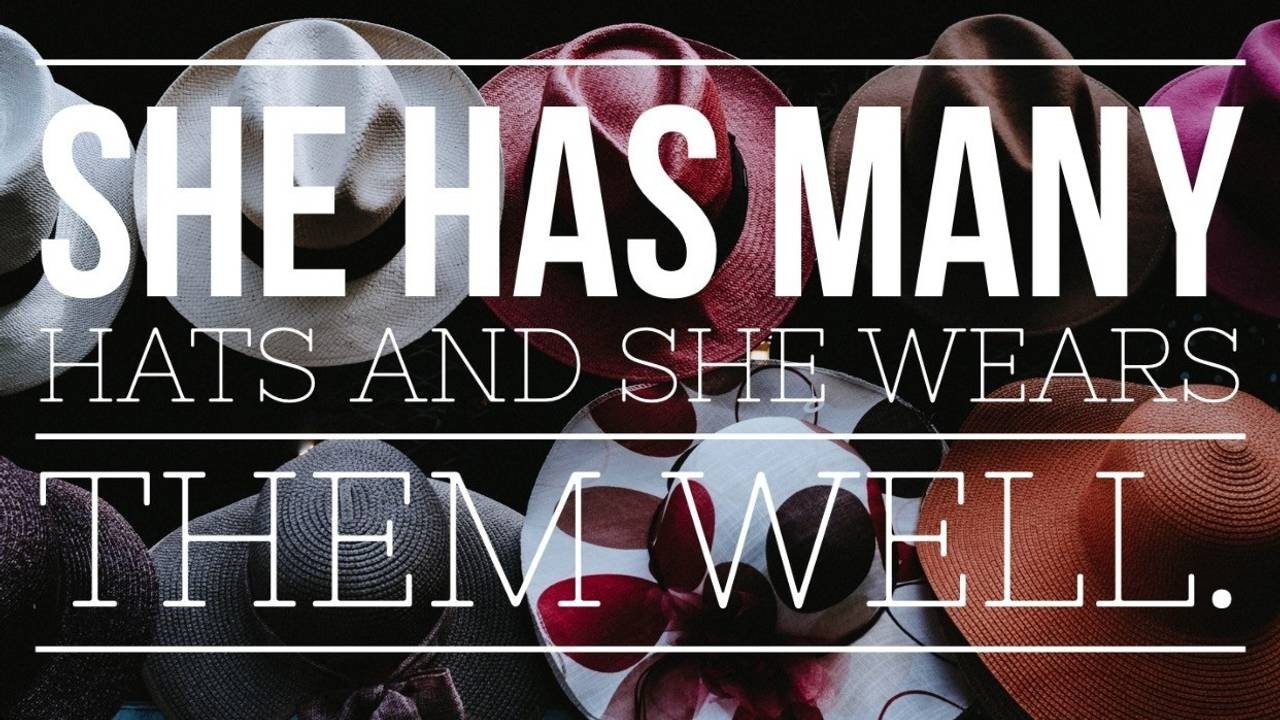In Praise of the Cavewoman and her many ‘Hats’

When we were newly married, Bob and I saw the play “Defending the Caveman” with some friends. Caveman is a one-man comedy that explores the innate differences between men and women with hilarious clarity.
Its premise is simply that we have been primally wired since pre-Neanderthal days in gender-specific ways that have stood the test of time.
Men descend from hunters who spent the better part of their days hiding in trees, focused on the singular task of finding an unsuspecting mammal that might become dinner.
Women descend from gatherers, who spent the better part of their days watching over children and completing any number of concurrent tasks like planting and harvesting vegetables, collecting water, preparing food, cleaning huts, building fires, whittling, sewing, cooking.
In short: Men are wired to do one thing at a time. Women are wired to multi-task.
Nowhere in my life is this more evident than when one of us takes a phone call. Bob sits down, in a chair, and stays put for the whole conversation. Me? I retreat immediately upstairs to fold laundry – or do some other mindless task that doesn’t take my attention away from the phone call, but ensures that I am accomplishing something with my hands while my brain, ears, and mouth are occupied.
Bob hunts. I gather. Bob wears one hat (at a time) while I wear many (usually at the same time). The examples and the metaphors are endless – and you can probably relate.
I’m thinking of this on Halloween because each of our hats is its own costume and its own role. The cook, the event planner, the bookkeeper, the chauffeur, the tutor, the coach, the researcher, the scheduler, the advocate, the investor, the volunteer, the counselor.
The different roles associated with these many hats can have real value in the workplace, but few women think that way.
Take the countless women who have come to me over the years. They are anxious to return to work after opting out for 10-20 years. Most bring a resume with them – typically, a pretty sorry-looking document where the ‘experience’ section begins in 2002. Really? I like to ask. Have you really done nothing worth reporting in 16 years?
Sadly, many of my clients think they haven’t. Or they fear what they have done has no value. I love proving them wrong.
My favorite exercise in our mini-course (and in the first module of our full Prepare to Launch U course) is a skills assessment. Yes, you’re an accountant, or you used to work in Product Management, or you have an Engineering degree, or your last job was in Human Resources – but you have done valuable work during your opt-out years too and, in this exercise, we help you identify, quantify and assign some marketing language around it.
We start by changing your mindset and helping you think of your unpaid experience as work currency.
Let’s say you handle the family finances. You pay the bills, balance the checkbook, track records in a spreadsheet, and organize the financial statements for your accountant. That’s Bookkeeping and Accounts Payable.
Perhaps you collect rent from a rental property or help your spouse invoice and collect payment for the family business. That’s Accounts Receivable. You know how to use Excel and probably Quickbooks – two important technical proficiencies.
Your work managing the family accounts is valuable work currency.
Perhaps you handle publicity for your children’s school. You write press releases and take photos to announce and promote events; maybe you write and publish a print or e-newsletter. That’s Marketing Communications.
But you also create and post promotional pieces on Facebook and Instagram, and manage the school’s website. That’s digital media. Or you plan and host fundraising events and solicit sponsors and donors. That’s Event Planning and/or Development.
Your volunteer work in the community is valuable work currency.
Maybe you helped your neighbor update his company’s employee handbook by editing it and suggesting some strategic additions. Or you help family and friends write their resumes or prepare for interviews. That’s important Human Resources work. Don’t discount it because you didn’t get paid or you only worked on it for a week.
Your short-term and unpaid work for friends and neighbors is valuable work currency, too.
You get the gist. And you can do this exercise yourself:
Start by making a list of all the things you do for your family. Then add all of your volunteer and community activities. Consider any traditional work you’ve done – including a one-day project – or unpaid (or bartered for) work you’ve done for a friend or neighbor, and add that to the list, too. Look over the list and ask yourself:
– What exactly do/did I do in this example?
– What is the name of the skill I am demonstrating?
– How can this skill benefit a potential employer?
Unsure? Show the list to a trusted friend or family member who is in the workforce – preferably a business manager, leader, or owner who hires people – and ask him or her the same questions.
Halloween, this night of terror, is the perfect night to face your fear that your opt-out years were wasted time (from a career perspective). Unless you’ve been lounging on the couch surfing Netflix all this time, you have done important work during your opt-out years. It has value – and so do you.
Employers want and need you in their workplaces – now more than ever. Put on your best “hat” and go find them!
